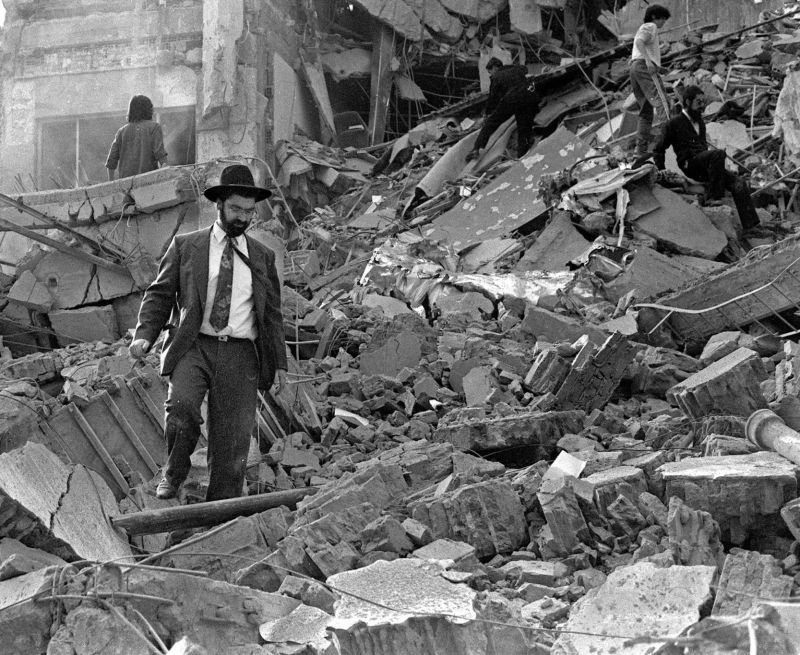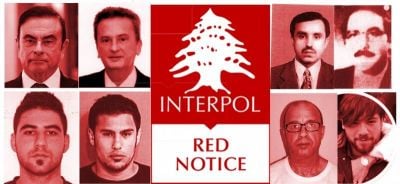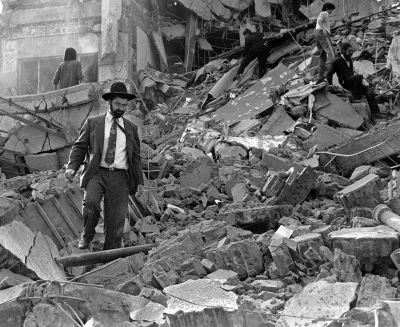
A man walks among the rubble after the bomb attack on the headquarters of AMIA, Argentina's Jewish association, on July 18, 1994. (Credit: Ali Burafi/AFP/ File photo)
BEIRUT — On Thursday, the Argentinian judiciary requested an international arrest warrant for four Lebanese nationals suspected of “secondary capacity” participation in the July 18, 1994 attack on the headquarters of the Argentine Israelite Mutual Association (AMIA) in Buenos Aires.
The attack on Argentina's Jewish community, the largest in Latin America, has never been claimed or solved, but the Argentine judiciary and Israel believe Hezbollah carried out the attack with Iran's support.
Arrest warrants for eight Iranians have been outstanding since 2006. Iran denied any involvement and refused to allow its top officials to be questioned. L'Orient-Le Jour looks back at the investigation launched 29 years ago.
July 18, 1994: A suicide bomber drives a van loaded with bombs into AMIA headquarters in Buenos Aires. The attack left 85 dead and 300 wounded.
Argentina openly suspects Iran of coordinating the organization of the attack, and of commissioning Lebanese members of Hezbollah to carry it out.
August 18, 1994: Argentina and Iran recall their respective ambassadors.
May 1999: A Hezbollah source interviewed by L'Orient-Le Jour denies any involvement in the attacks.
2001: Trial of the bombings begins.
January 23, 2002: Swiss justice investigates suspicions that former Argentine president Carlos Menem received funds from Iran to cover up Teheran's possible responsibility for the bombing.
October 1, 2002: Argentina asks Interpol for information on Hezbollah Secretary General Hassan Nasrallah and on the activities of several Iranian diplomats in the year of the attack.
February 23, 2003: Argentine courts issue arrest warrants for some 20 Iranian diplomats and religious leaders. The warrants target former Iranian ambassador to Argentina Hady Soleimanpur, former cultural advisor Mohsen Rabbani and the Supreme Guide of the Islamic Republic Ali Khamenei, as well as former Hezbollah military chief Imad Moghnieh.
March 2003: 12 arrest warrants are issued against Iranians, all still outstanding
August 21, 2003: The former Iranian ambassador to Argentina, Hadi Soleimanpour, is arrested in the UK at the request of the Argentine judge investigating the attack.
August 24, 2003: Iran breaks off all economic cooperation with Argentina, in retaliation for the arrest of Soleimanpour.
September 2, 2003: Iran sends its lawyers to Argentina to gain access to the investigation file
2004: The bombing trial ends in a climate of frustration, with the acquittal of five Argentinians on charges of providing logistical support.
November 2005: Argentine courts accuse a 21-year-old Lebanese member of Hezbollah, Ibrahim Hussein Berro, of perpetrating the attack.
October 25, 2006: Argentina officially accuses Iran and Hezbollah of the attack. The decision to carry out the attack "was taken by the highest authorities of the Islamic Republic of Iran, which commissioned Hezbollah to carry out the attack", says Alberto Nisman, the head of a team of prosecutors in charge of the investigation. An international arrest warrant is requested for the highest authorities in the Iranian government at the time, including President Ali Rafsanjani.
March 15, 2007: Interpol issues international wanted notices for the extradition of five Iranian leaders and one Lebanese, Imad Moghnieh, accused by the Argentine judiciary of having played a role in the attack.
February 12, 2008: Imad Moghnieh is assassinated in a car bomb explosion in Damascus, with Iran accusing Israel of being behind it.
July 17, 2011: Iran says it is ready to cooperate with the Argentine government to investigate the attack.
July 18, 2011: Iran is asked to hand over eight suspects. However, Tehran refuses the request for the arrest and extradition of several officials, including the Minister of Defense.
January 27, 2013: Argentine President Cristina Kirchner announces an agreement with Iran on the creation of an independent commission to investigate the attack.
March 30, 2013: Iran approves the agreement with Argentina to investigate the attack. The two countries form teams to meet in November in Geneva.
Early 2015: Prosecutor Alberto Nisman, in charge of investigating the 1994 attacks, launches a charge of obstruction of justice against ex-president Kirchner, prosecuted for encouraging parliamentary approval of an agreement with Tehran, providing for senior Iranian officials suspected of masterminding the attack to be heard outside Argentina, thus enabling them to evade justice.
January 18, 2015: Prosecutor Alberto Nisman is found dead in his Buenos Aires apartment on the eve of presenting his indictment against Cristina Kirchner.
May 19, 2015: Ali Akbar Velayati, former Iranian foreign minister, and Mohsen Rabbani, cultural attaché at the Iranian embassy in Buenos Aires in 1994, who are among those accused of the attack, claim to have had nothing to do with the attack.
July 20, 2016: Argentina requests the extradition of Ali Akbar Velayati.
December 7, 2017: An Argentine judge orders a repeal of immunity and the arrest of ex-president Kirchner for obstructing the investigation. Federal Judge Carlos Bonadio also orders the arrest of former Foreign Minister Hector Timerman and several other former high-ranking Argentine officials.
July 18, 2019: Argentine authorities order a freeze of Hezbollah's assets in the country and label the party a "terrorist" organization.
July 19, 2019: The United States sanctions Salmane Raouf Salmane, Hezbollah's head of external security, suspected of coordinating the attack. He is of Colombian and Lebanese nationality and, according to the Treasury, continues to direct terrorist operations on the American continent on behalf of Hezbollah.
October 7, 2021: The Argentine courts dismiss the case against the country's Vice President Cristina Kirchner, accused of obstructing the investigation into the bombing on behalf of Iran.
Late 2022: The prosecutor in charge of the investigation requests an arrest warrant on the basis of "well-founded suspicions" concerning four Lebanese nationals — Hussein Mounir Mouzannar, Ali Hussein Abdallah, Farouk Abdel Hay Omairi, Abdallah Salmane — who are said to be "collaborators or operational agents" of Hezbollah.
June 15, 2023: Argentine courts request an international arrest warrant for the four Lebanese suspects.

